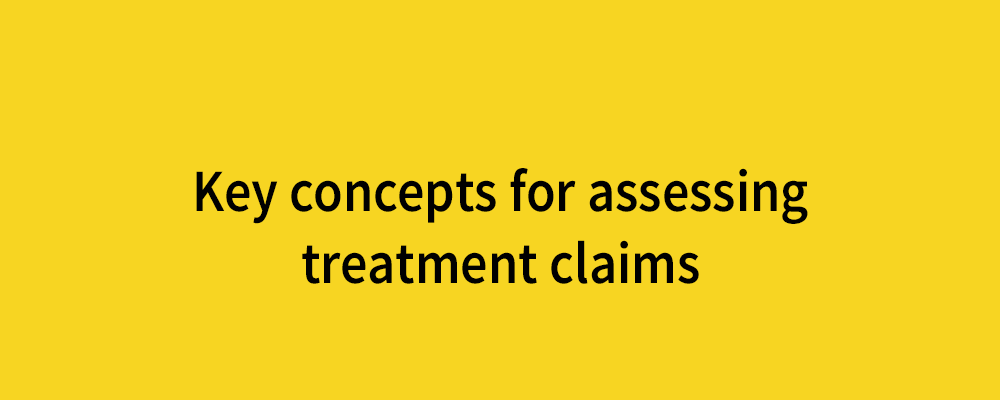In this blog for our Understanding Evidence series, Emma Carter and Selena Ryan-Vig from Cochrane UK share resources to help you get to grips with some key concepts that can help us to think critically about treatmentSomething done with the aim of improving health or relieving suffering. For example, medicines, surgery, psychological and physical therapies, diet and exercise changes. claims.
Page last checked: 05 April 2023.
“Drinking coffee reduces your liver cancer riskA way of expressing the chance of an event taking place, expressed as the number of events divided by the total number of observations or people. It can be stated as ‘the chance of falling were one in four’ (1/4 = 25%). This measure is good no matter the incidence of events i.e. common or infrequent. by 50%”
“Powerful new HIV drug… is hailed a success”
“Eating plenty of salmon, mackerel and sardines protects against Alzheimer’s”
These are just a handful of claims about treatments you might have come across recently. But every day – in the news, in conversations with friends and family, while browsing the internet – we’re exposed to numerous claims like these. Making sense of treatment claims, whether they’re about drugs or diet, can be difficult. Claims may be biased, unsubstantiated, or inaccurate.
As difficult as it may be to assess treatment claims, it’s also essential. At best, making health decisions based on unsubstantiated assertions is a waste of time and money. At worst, it can be harmful. But how can we make sense of it all?
How can we assess treatment claims?

To help us out, an Informed Health Choices (IHC) project team has developed (and since revised) ‘a list of ‘Key Concepts’ that people may need to understand to assess treatment claims. We can apply these concepts to help us think critically and decide whether, for example:
- “The basis for a claim is reliable; e. whether it is based on fair comparisons of treatments. (A fair comparison being one which is designed to minimise the risk of errors).
- The results of fair comparisons are relevant to you.
- Additional information is needed to assess the reliability and relevance of claims about treatments and, if so, what information is needed” [1; p.113].
Three Groups of Key Concepts
At the time of writing (in 2019), the Key Concepts are divided into three groups, shown below with an example that falls into each group:

Discover the Key Concepts for yourself
The Students 4 Best Evidence (S4BE) community was keen to raise awareness of these vital concepts and a group of students prepared a series of blogs, to explain and elaborate upon each of the Key Concepts.
This series of blogs bring the Concepts to life with examples and short and shareable videos at the bottom of each blog. They also signpost to resources relevant to each Concept to further help you to think critically about treatment claims. They have also been ‘quality assured’ due to the generous support and advice from Iain Chalmers, from Testing Treatments interactive.
Here’s one of the videos on the Key Concept ‘Treatments can harm’:
Video script: Treatments can harm. People often exaggerate the benefits of treatments and ignore or downplay potential harms. However, few effective treatments are 100% safe. Always consider the possibility that a treatment may have harmful effects. Thanks to the Informed Health Choices project for the development of the key concepts.
The Informed Health Choices project team has carried out multiple revisions of the Key Concepts. Since S4BE completed their blog series, the IHC team has revised and added to the list. You can find the latest version of the concepts on the Informed Health Choices website.
Get involved
If you are a student of any discipline, interested in evidence-based healthcare, and would be interested in getting involved with Students 4 Best Evidence, please get in touch by email general@students4bestevidence.net or tweet us @Students4BE – we’d love to hear from you!
Join in the conversation on Twitter with @Students4BE @CochraneUK @IHC_project @TestTreatments or leave a comment on the blog.
Further reading
Oxman AD, Chalmers I, Austvoll-Dahlgren A and Informed Health Choices group. Key Concepts for assessing claims about treatment effects and making well-informed treatment choices [version 2; referees: 3 approved]. F1000Research. 2019 Jan,7:1784. doi: 10.12688/f1000research.16771.2.
Reference
- Austvoll-Dahlgren A, Oxman AD, Chalmers I, Nsangi A, Glenton C, Lewin S, Morelli A, Rosenbaum S, Semakula D, Sewankambo N. Key concepts that people need to understand to assess claims about treatment effects. J Evid Based Med. 2015 Aug;8(3):112-25. doi: 10.1111/jebm.12160.


